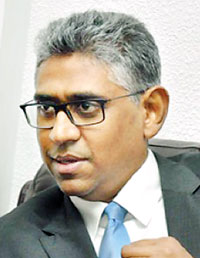News
SLFP, UNP must contest local polls as one front
View(s):The Yahapalana Government is faced with two immediate challenges. The first is to hold local council elections without any further delay and the second is whether to face the elections separately as the SLFP and as the UNP or jointly as the Yahapalanaya combine like at the presidential elections.
The long-delayed local council elections have now been confronted by a new stumbling block in the form of a legal challenge to the Delimitation Gazette issued by the Local Government Minister Faiszer Musthapha. It has also resulted in a political fallout with both the Joint Opposition and the Janatha Vimukthi Peramuna presenting two separate no-confidence motions against the minister in relation to his inability to hold the elections on time.
It is clear that the minister has a great deal to answer for in relation to the long delay in holding the elections. Delimitation Review Committee Chairman Asoka Pieris himself has gone on record stating that he had been asked by the minister to delay his report. On another occasion when Mr. Pieris turned up at the ministry on a date given by the minister to hand over the final report, Mr. Pieris found to his dismay that the minister had gone abroad.
Whenever the minister was questioned about the delay in holding the Local Government Elections Mr. Musthapha’s stock answer was that he would issue the relevant gazette immediately after Mr. Pieris handed over his report. But once Mr. Pieris did hand over his report the minister took several months to issue the gazette. And after all that the gazette is now being challenged in courts on the basis that there was a legal flaw in the gazette which, the JVP alleges, could not have been an oversight given the minister’s credentials as a President’s Counsel and could only have been a deliberate ploy to further delay the local council elections.
The legal challenge itself has aroused suspicion. The independent election monitoring body PAFFREL has called it a definite political conspiracy. It is rather baffling how six petitioners from different parts of the country woke up one morning and decided to challenge the relevant gazette at the same time. The JVP has alleged that the petitioners were linked to SLFP politicians in the Government.
Another factor that has aroused suspicion is the choice of counsel for the petitioners. It has been reported in the media that N. M. Shahied who started his career as a junior to the Minister’s father Faisz Musthapha and continues to remain his close associate is appearing for all the petitioners. If this is correct it is again a rather amazing coincidence that the six petitioners from different parts of the country decided to choose the same counsel for their legal challenge. JVP Leader Anura Kumara Dissanayake speaking in Parliament has dubbed the case as “Musthapha vs Musthapha”. However, for those not familiar with the law it must be stated that the petitioners were well within their right not only to institute legal proceedings but to choose the same counsel.
It is only from a political point of view that the question of whether the petitioners were acting independent of each other or whether they were part of a coordinated operation is a matter of interest. An examination of the six different petitions will shed further light on the matter. If the wording in the six petitions shows a close or striking resemblance to each other, it will be easier to come to a conclusion on the matter.
The two no-confidence motions also have political implications for the Government. The UNP backbenchers, too, have expressed their disapproval of Mr. Musthapha’s conduct in handling the local council election issue.

Local Government Minister Faiszer Musthapha: Facing two no-confidence motions
In this context if the Joint Opposition, the JVP and the UNP vote for the no-confidence motions the two motions will be easily carried and the minister will be compelled to resign. If the UNP abstains from voting, it will be touch and go for the Minister because the Joint Opposition votes together with those of the JVP will be more than that of the SLFPers in Government. In such a situation the TNA s votes will become critical.
Given the current context vis-à-vis the further postponement of the local council elections, there seem to be only two possible options for the Government. Minister Champika Ranawaka has on a previous occasion stated that the absence of a political leadership at the local government level contributed to the failure of the collection of garbage which has in turn contributed to the spread of dengue in the recent past. Although the political leadership of the local government comprised a number of bad eggs and criminal elements in the past it is still a necessary layer of government and an important part of the democratic landscape. Hence the continued postponement of the elections is not a feasible option for the Government.
The first option for the Government is to ensure that elections are immediately held to the local bodies that are not affected by the gazette that is being challenged in the Court of Appeal and the rest after the issues before the Courts are sorted out. The other option would be to hold the elections under the previous Proportionate Representation system. For this Parliamentary intervention will be necessary.
When the local council elections were being continuously delayed the UNP on different occasions expressed its willingness to have this round of elections to local bodies on the old PR system to avoid further delays and to hold subsequent local council elections under the new system.
In fact, there are good reasons for the mixed system of elections to be used in the next round of local council polls and not this one. The shoddy process followed to approve the amendments to the Local Government Election Law did not leave much time for the public or Parliament to discuss the legislation. Consequently what has been produced is a shoddy piece of legislation leaving many areas subject to different interpretations and also a lack of clarity.
Two instances maybe cited. Firstly there is no provision for a single candidate to contest a ward in a local body. All candidates have to be part of a list and an individual cannot contest by himself. This is contrary to the normal cannons of Local Government where individual interventions have been of great value in the past.
Another issue is that of multi-member constituencies which are being introduced for the first time. The concept of a multi-member constituency has been used in parliamentary elections to ensure minority and other interests are represented. While these may be relevant in parliamentary and similar elections in view of the National nature of the legislation discussed in those Assemblies it has hardly any relevance to discussions in local bodies. Besides when the country is on reconciliation mode it is necessary to encourage people at the grass roots not to use ethnicity as a yardstick to elect people to local bodies. In fact, elections to local bodies should be designed to ensure that the process promotes national unity and nation building by making local bodies building blocks to achieve these larger national objectives.
In any event it is not clear whether multi-member constituencies as envisaged by the new law will ensure minority representation. The way the legislation is drafted could result in all the representatives elected in a multimember constituency being from the majority community.
The second challenge facing the Yahapalana Government is how the two main constituent parties are going to face the local council elections. Already the cracks are beginning to show in the Government with parliamentarians in the UNP and SLFP criticising each other on public platforms. A highly contested election campaign in which the UNP and SLFP are pitted will result in the criticism of each other reaching higher levels and can render the continued existence of the National Unity Government more difficult after the elections.
Meanwhile, there are also moves to reunite the two factions of the SLFP and contest as one party the sole aim of which is to defeat the UNP. This raises more questions than it answers. If the two factions of the SLFP join together what happens to the pledges made to the people at the January 8, 2015 election.
President Maithripala Sirisena together with the UNP and other civil society organisations promised the people that the Executive Presidency would be abolished, a new Constitution would be enacted, the problems of the minorities would be resolved , those guilty of corruption would be punished, new anti-corruption measures would be adopted, strengthening democracy among a host of other measures. The Joint Opposition has different views to President Maithripala Sirisena on many of these matters.
For instance the Joint Opposition does not believe a new Constitution is required; nor does it acknowledge that there was widespread corruption during the tenure of the previous Government. If the two factions of the SLFP unite, will it mean that these pledges given to the people will be simply forgotten?
Neither President Maithripala Sirisena nor Prime Minister Ranil Wickremesinghe nor their respective parties have the right to change the direction the people of this country chose for themselves on January 8, 2015. The Yahapalana Government has a great deal of unfinished business to complete.
None of the constituents of the National Unity Government has the moral right to jeopardise the future of this Government by contesting the local council elections separately. The President and the Prime Minister need to iron out the misunderstandings between the parties and move forward.
The National Interest demands that the SLFP faction of the Government and the UNP contest the local council elections as one front like the January 8, 2015 election. They are obliged to fulfil their promises to the people. They do not need to wait until 2020 to fulfill the Yahapalana objectives. If they could complete it by 2019 or even 2018 the people will not mind them going their separate ways after they can truly say to themselves “mission accomplished”. (javidyusuf@gmail.com )

